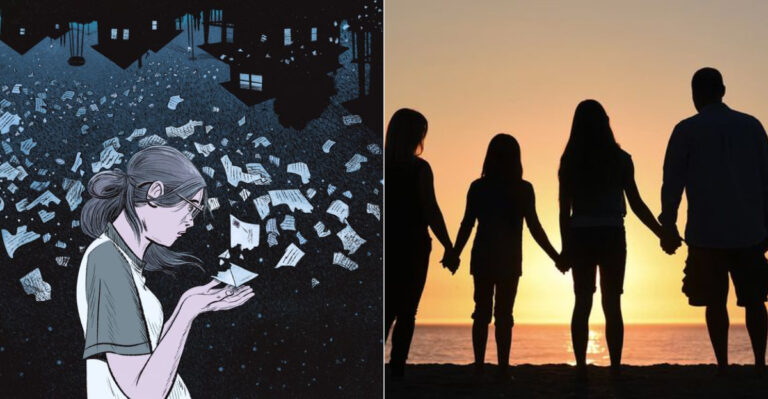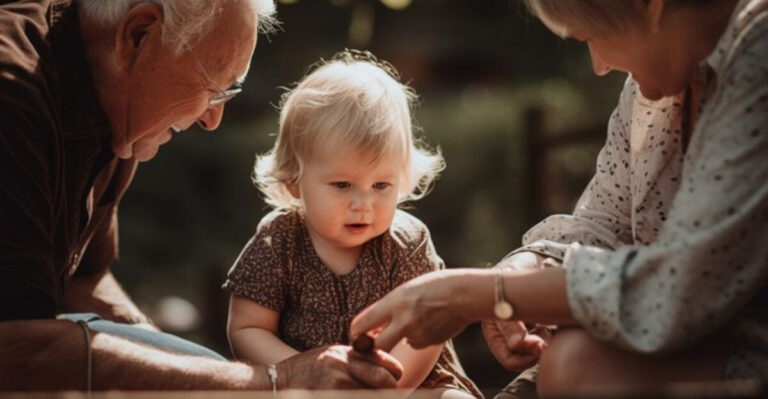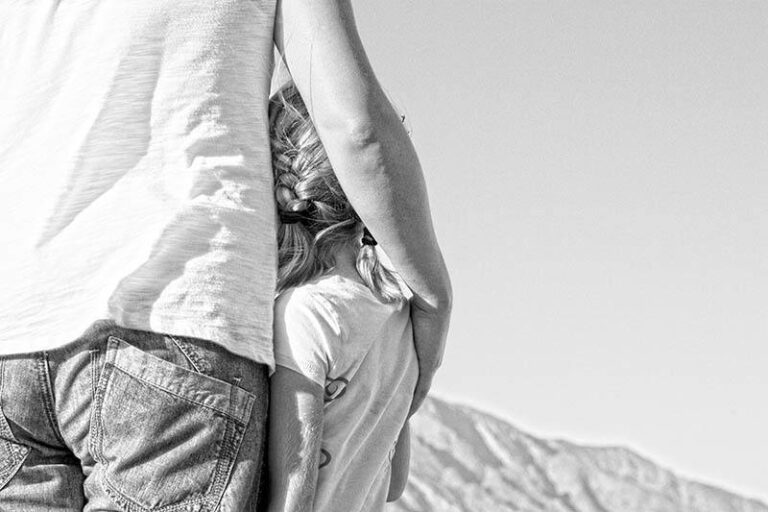Back To Basics: 17 “Useless” School Rules From the Past That Taught Us Respect, Connection, and Family Values
Do you ever notice how some rules felt like pure torture as a kid? The ones our parents, teachers, and the grown-ups swore by—like you’d lose all common sense if you didn’t follow them?
Now, looking back, it’s obvious: those so-called useless rules actually handed us something priceless. Not just manners, but a sense that we belonged, that we mattered to each other, and that actions had weight. The world spun slower then. But those old-school rules stuck around like stubborn stains on your favorite jeans. They shaped how we showed up for family, for friends, and honestly, even for strangers.
Here are 17 forgotten school rules that taught us way more than just how to behave—they handed us respect, real connection, and a backbone worth passing on.
1. No Complaining About Food
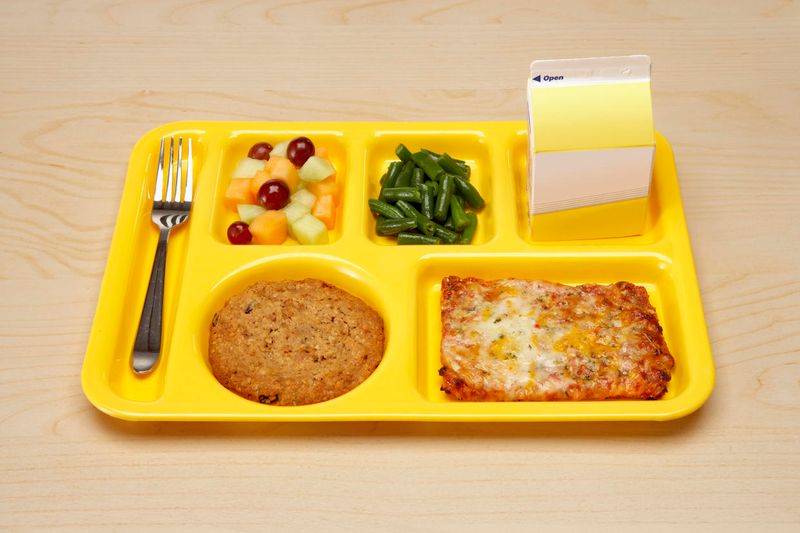
My sister nearly cried the first time she saw peas on her plate at school. But you remember the rule: you ate what was served, no whining, no exceptions. The lunch lady didn’t care if you hated meatloaf or if the carrots tasted like plastic. You ate, or you went hungry.
It wasn’t cruelty—it was about gratitude. Every bite was a reminder that not everyone got a meal, and wasting food was a slap in the face to whoever cooked it. You learned to say thank you, even when it tasted like cardboard.
Decades later, I still clean my plate out of habit. That old rule taught us gratitude (and, let’s be honest, a creative way to hide beets under mashed potatoes).
2. Bed-Making Before Breakfast

Ever get yelled at for stumbling to the breakfast table with your bed still a mess? Yeah, me too. Beds had to be made before you did anything else—no shortcuts.
It wasn’t about military precision. It was a ritual, a way to start the day with a win. One small thing in order before the world’s chaos hit. Mom said it showed respect for your space and the people you lived with.
Funny, I still make my bed before coffee. It’s muscle memory, and it’s comforting. A little island of order when everything else feels like chaos.
3. Thank You Notes for Gifts
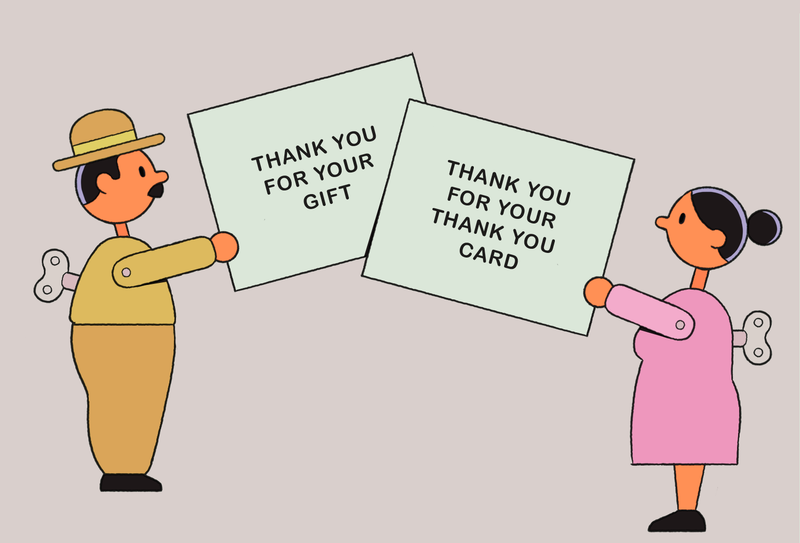
Handwritten thank you notes were non-negotiable in our house. You got a gift? You sat down, grabbed a real pen, and wrote a note. Didn’t matter if you already said thanks in person. It had to be in writing.
At the time, it felt like pointless busywork. But those notes—simple, honest—taught us how to acknowledge kindness and effort, not just gifts. They built bridges with relatives you barely remembered and made you think about gratitude.
Even now, I keep a box of notecards in my drawer. There’s something sacred about saying thank you the old way.
4. Strict Bedtimes (No Negotiation)

Never mind what your friends’ parents allowed—once the clock hit bedtime, you were done. No arguments, no begging for five more minutes. Lights out meant lights out.
As a kid, it felt like punishment. But honestly? It kept us grounded. Sleep was sacred, and the grown-ups guarded it like it was gold. You woke up rested, and you showed up for school like you meant it.
Now, when I see kids with dark circles at breakfast, I get it. That rule wasn’t about control—it was about care, even if it came wrapped in a stern voice.
5. No Interrupting Adults

In our house, when grown-ups talked, you waited your turn. Didn’t matter how urgent your news was—interrupting was a cardinal sin. You learned patience, and you learned respect.
I remember bursting with excitement to share I’d won the spelling bee. I bit my tongue until my parents finished their debate about bills. That pause taught me self-control.
Today, I notice who interrupts and who listens. Turns out, the kids with patience grew into adults who know how to hold space for others.
6. Shoes Off at the Door

My cousin used to stomp in from soccer and track mud all over Grandma’s rug. She shut that down fast. Shoes came off the second you hit the door, no exceptions.
This wasn’t just about dirt. It was a sign of respect for the home someone built and cared for. You contributed to a clean, welcoming space, not chaos.
Decades later, I still can’t walk into someone’s house without checking my shoes. It’s a tiny act that says: I see your effort. I’ll take care, too.
7. Chores Before Play
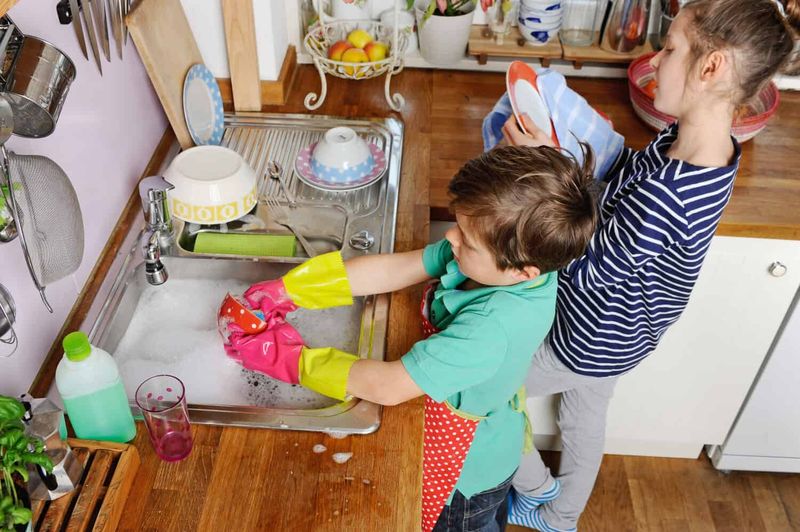
Saturday mornings belonged to chores. No cartoons, no bikes, no friends until the dishes were done and the trash was out. You learned that work came before fun.
At the time, it felt like a drag. But those chores hammered home the idea that family was a team, and everyone pulled their weight.
I see it now when my kids ask, “Can I go out?” and I hear myself say, “Finish your chores first.” It’s not punishment. It’s a lesson in showing up for each other.
8. Hands Off—No Borrowing Without Asking

Caught my brother sneaking my Walkman once. He thought I wouldn’t notice, but that wasn’t the point. The rule was clear: you didn’t touch someone’s things without permission.
It was about trust. Boundaries mattered, even between siblings. That tiny boundary taught us to value privacy, to ask before we took.
Now, I’m grateful for it. Turns out, respecting someone’s stuff leads to respecting their feelings, too.
9. Respect for Teachers—No Backtalk

Teachers ruled their classrooms like tiny kingdoms. You didn’t talk back, roll your eyes, or challenge them in public. The line between student and teacher was drawn thick.
Back then, it felt strict and sometimes unfair. But in hindsight, it shaped how we treated authority and learned self-discipline.
The best teachers weren’t just enforcers—they were role models. We learned to listen, to question respectfully, and to show up with our best. That’s respect hard-earned.
10. No Phones at the Table (Or, No Toys)
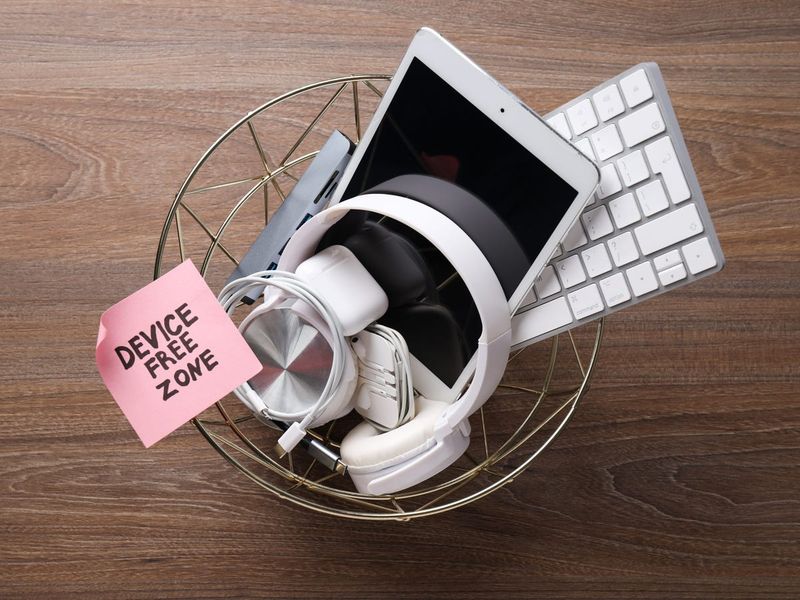
Dinner meant faces up, not down. No Game Boys, no passing notes under the table, and if cell phones existed, those would’ve been banned too. The table was for connection, not distraction.
Some nights, it felt awkward. We didn’t always have big news or perfect conversation. But being forced to share space and stories wove us closer together, even when it was uncomfortable.
I wish more tables kept that rule. The best moments came on nights when all we had was each other.
11. Actions Have Consequences

The scariest words: “You made your bed, now lie in it.” Break a rule, face the fallout—no rescue, no endless negotiating. You learned cause and effect, sometimes the hard way.
Consequences weren’t about punishment. They were about learning that choices have ripples, and that cleaning up your mess is part of life. The lesson stuck, long after the sting faded.
Now, when I see a kid get endless second chances, I remember how it felt to take responsibility. It hurt, but it made us stronger.
12. Waiting Your Turn

Playground politics could get brutal. But one thing was sacred: you waited your turn. Cut the line, and you’d get called out—by kids, teachers, or both.
It seemed pointless at the time, all that standing and waiting. But it taught us patience and fairness, and that the world didn’t always bend to our schedule.
Years later, I find myself tapping my foot in the grocery line. But I wait. Some things are better when everyone gets a chance.
13. No Name-Calling—Ever
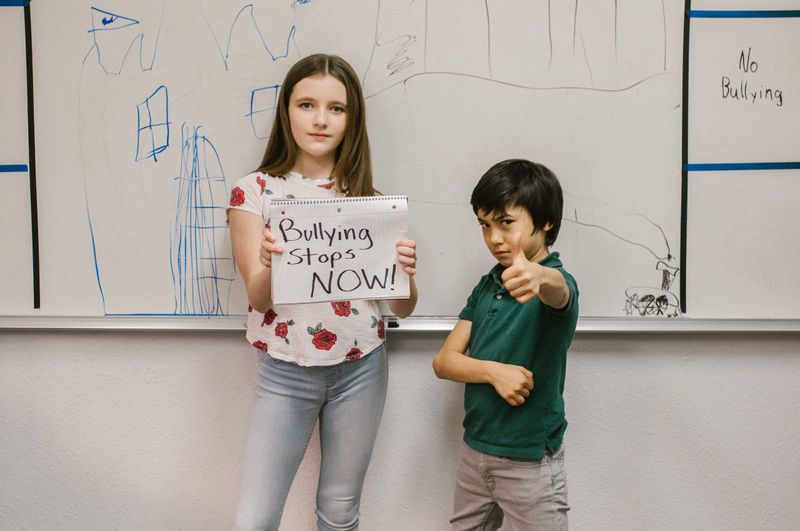
“Sticks and stones,” they said, but name-calling was never okay. Even when everyone else did it, the rule at home and school was clear: words could cut deeper than bruises.
Breaking that rule stung more than most. You had to apologize, out loud, and sometimes to a room full of giggling classmates. Humbling, but unforgettable.
Now, as an adult, I hear echoes of that lesson everywhere. Words matter. They can heal or harm, and you get to choose.
14. Sharing Is Non-Negotiable
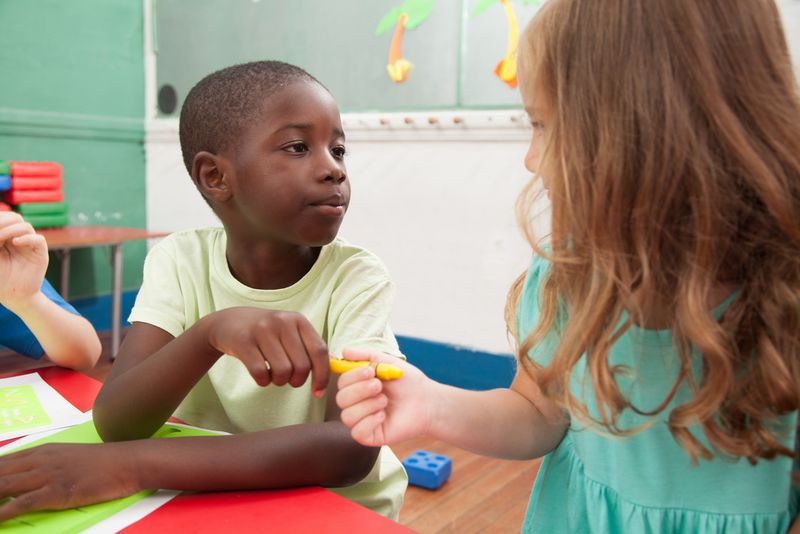
You could have the shiniest new toy or the last cookie in the box—didn’t matter. If someone needed it, you shared. Selfishness got called out fast.
This wasn’t about forced generosity. It was about community. Sharing showed you cared enough to see someone else’s need, even if it meant letting go of something you loved.
It’s wild how simple that is, and how hard it can be now. Sharing built trust, and trust built everything else.
15. Raise Your Hand to Speak

The quickest way to get in trouble? Blurt out an answer without raising your hand. The rule felt stiff, but it taught us to listen and take turns.
The raised hand became a little act of respect for the group, not just the teacher.
Sometimes I miss that kind of order. A room full of people taking turns, actually hearing each other—that’s rare now.
16. No Leaving the Table Without Permission
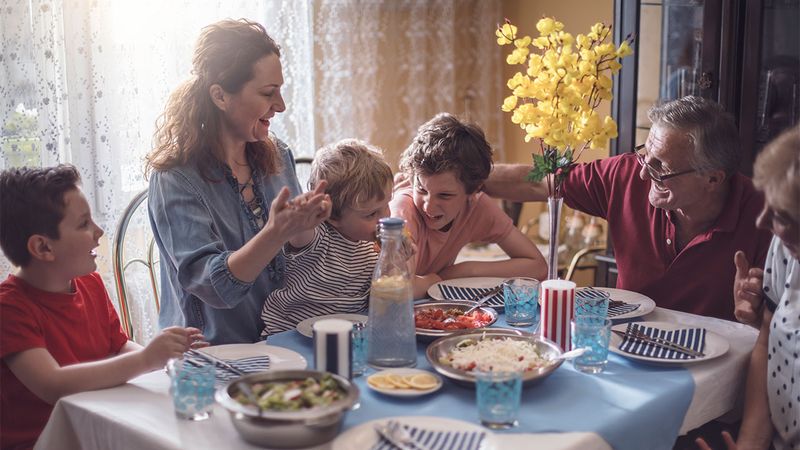
Supper finished? You didn’t just disappear. You asked to be excused—out of respect for the people who made the meal and sat with you.
Sure, it felt old-fashioned. But it made you see dinner as something shared, not just eaten. You belonged to each other, if only for a few minutes.
The world moves fast now, meals get skipped. But I still hear my mom’s voice: “Did you ask to be excused?”
17. Wash Up Before Meals

It didn’t matter if you were starving from playing outside all day—no one touched food until hands were washed. Germs weren’t the point (though they mattered). Clean hands showed respect for the meal and everyone sharing it.
I still remember the sting of cold water, the slippery soap, and my dad’s inspection of our hands before we sat down. It was a ritual that brought us together, clean and ready to share.
It’s funny—clean hands, clear mind. We washed away the day, then gathered as a family.


